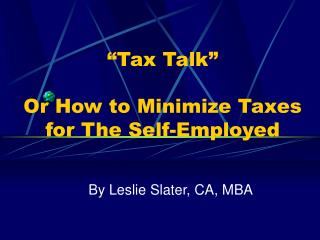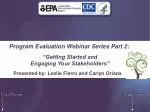
“Tax Talk” Or How to Minimize Taxes for The Self-Employed
Presentation Transcript
“Tax Talk” Or How to Minimize Taxes for The Self-Employed By Leslie Slater, CA, MBA
Topics to Be Covered • Similarities and Differences between incorporated businesses, and unincorporated • Income taxes • Ownership structures • Paying yourself • Paying family members • Taxation of profits
More Topics • Expenses of car, home office, meals and entertainment, travel, etc. • Health Spending accounts • IPP’s • CPP, GST, PST • SRED and other government programs
Final Topics • Salary/Dividend Decision • New Dividend Tax Credits • Should you incorporate? • Your employees – how can you help them and yourself
Incorporated Companies • Separation between you and your company • Ownership can be you, other business partners, your spouse, adult kids, a family trust, other corporations • Corporation pay its own federal and provincial taxes separate from you • You are paid salary/bonuses & dividends
How are you really paid? • If draws due to inconsistent cash-flow, then need to either show self-employment income or dividends • Don’t want it to be a series of loans and repayments • Company then doesn’t pay employer CPP • Shareholder loans/draws need to be zero at end of your fiscal year
Important Tax Rates • CCPC are charged 18.6% in Ontario on first $300k of active business income – then pay dividends after corp tax • Increasing to $400k January 1, 2007 • Ontario lowered rates on $400k so there is a another tax bracket – 26.3% • Over $400k, pay 36.1%-40.8% on ABI
New Dividend Tax Credit • For dividends paid out of earnings not subject to federal small business rates or investment income (after Jan 1, 2006) • So not relevant to the salary/dividend decision below $300k (moving to $400k)
Salary versus Dividends • At all levels of corporate income, there is deferral of taxes for income left in the company and invested since corp rates are less than personal rates • But will pay high taxes on the investment income unless pay it out to shareholders • Ultimately about 3% less taxes by paying dividends versus salary • And salary attracts CPP, EHT
So how do I make the decision? • Generally bonus down to SBD until 2010 when rate changes may make you neutral • Below SBD, pay dividends unless you are already below SBD before start • If below $300k when you start, do you pay dividends or salary?
Salary, dividends or leave it in? • Salary is • earned income for RRSP, • subject to CPP, • part of EHT calculation on total payroll • Considered for debt servicing levels • So generally pay tax until reach levels for desired RRSP and debt servicing • Max 2006 $106k x 18% = 19,000 if desired
Leave it In? • Tax deferral –i.e. no personal taxes yet • But need to watch how big your investment assets get – 50% of assets for 2 year, 90% • Income on investments taxed at high rates if not needed during business cycle • Refundable taxes if pay out dividends ($1:$3 ratio)
So The Decision • Leave cash in the business if • don’t plan to sell within 2 years, • below the $300k (soon 400k) and • you are at your desired earned income levels • but watch you don’t build up too much • Have income split to lower tax brackets with family members
Income Splitting with Family • Can pay high reasonable amount for work done • Have to actually pay them; and get invoices if they are contractors • Spouses can be partners or shareholders • Family Trusts can be partners or shareholders
Income Splitting Cont’d • Sole proprietorship – pay for work done • Partners – + allocate partnership profits • Shareholders – dividends (but not to minor children), duplicate capital gains exemption if sell shares (but need to pay them) • Many considering everyone in a family trust for maximum discretion on allocations
Similarities between Corp & Other • Paying family members for work done • Home office as principal place of business • Meals and entertainment • Travel • GST, PST
Differences • Car • Paying family owners • Health spending accounts vs group medical • CPP • SRED and other government programs • IPP’s
Home Office • Principal place of business; all costs (except mtg princ) x sqft/sqft or #rooms • Consider market rates to charge incorp co • Rental income on your personal tax return • Lease with company • If not princ. place, then regularly and continuously meet clients there and exclusive business use (court cases)
Meals and Entertainment • 50% deductible by company or self-employed • 50% for GST Input tax credits • Keep track of who you entertained on the receipt to show business purpose • Don’t want to be shareholder appropriations if incorp; double taxation
GST • Need to register where >30k last 4 quarters • Start usually as annual filer and remitter • Move to quarterly remitter or filer based on first year • If have a refund always (e.g. US sales and Cdn costs), then want frequent filing • CRA doesn’t like sending big refunds
GST cont’d • Value added tax – difference between amount charged and amount paid • Have to keep track to both unless use other method • Quick method – $200k limit • 6% as of July 1, 2006 changed rates for calculations
GST over the Internet • If US resident – zero-rated but you have to have declaration from them • What are you selling – an intangible or a service (software can be either) • If wholly outside Cda, not required on service • If intangible with right to use in Cda - GST
PST • Sales tax, not value added tax • Consider all items that go into your product • E.g. software companies might provide owners with CD’s, paper manuals, use development computers and can buy these without PST
PST over Internet • How and where delivered • If delivered electronically, servers outside Ontario and can’t download in Ontario, then no PST • If can download in Ontario, then PST • If delivered in other provinces, may have HST (BC based on if you do direct advertising) • Complicated so check it out
Car • If self-employed, write-off the business proportion of all your auto costs (s/t max $800/mo, 30k cost) • If corporation, then difference if company owned or leased (taxable benefit) versus personally owned or leased • If personally owned or leased, can charge company .50/km first 5,000 and $.44/km over and no taxable benefit or chg allowance (taxable income)
Health Spending Accounts • Health Spending Accounts only available to corporations • You make a contract with your company to cover list of medical expenses and put a set monthly amount in separate bank account each month until employee submits the medical expenses and gets reimbursed • Account is not considered part of company books
Health Spending (cont’d) • No maximum, but should do set monthly amount • Unlike group premiums for self-employed where get to deduct $1,500 for self, $1,500 for spouse and $750 each dependent child from business income (not incl life, ltd) • Need to establish for all employees • Monthly amounts are deductible to co; not taxable benefit to employee
CPP • If incorporated, then company pays employer portion of CPP • Self-employed pay both sides when file their personal tax returns – 9.9% of 42,100, max $3,821 in 2006 • If within 15 years of retirement, want to ensure that you are maximizing your CPP contributions • Can receive as early as 60 (reduced); normal 65
SRED • SRED is Scientific Research and Experimental Development • Only available to corporations • Important cash incentive to software companies & manufacturers in Cda where contribute to tech advancement and where there was tech uncertainty • Pays $ even if don’t pay any income tax • Approved SRED can be collateral for bank loan
Other Government Programs • Mainly focused on corporations • Some provide cash even if no taxes, some match funds (e.g. IRAP) and some provide income tax credits against taxes payable • Ontario has some focused on media • Also, there are government funds looking to encourage innovation
IPP (Individual Pension Plan) • Can define a smaller group (you, your partners, but not general employees) to be covered • Corporation - need employee relationship • IPP’s useful to accumulate larger amts than RRSP’s, get company deduction, if around 50, steady corp. cash-flow, and have been running the corp. for a number of years • Companies will calculate benefit and consult for free; set up costs coming down
So Should You Incorporate? • If you make more money than you need or want to live on – yes, tax deferral at least • If there is liability risk – yes, corporate veil • If there are contracts which are not assignable • If you have income splitting opportunities with spouse and/or children
Incorporation Advantages • If you think you qualify for SRED or other government programs • If you think you’ll be in business for a while and ultimately sell – capital gains exemption • If you might want do retirement planning (IPP’s) or health spending accounts
But what about your employees? • How can you help them to minimize their taxes? • Specify in employment contract that they need home office (e.g. technology workers) with internet connection, cellphone, and personal computer; car also • Give them a T2200 to write off these against their employment income
Other Ideas for Your Employees? • If they negotiate contracts, pay some of remuneration as commission and specify as such on T4 slip • Commissioned employees have more write-offs than salaried – even their fees for income tax preparation • If they pay part of their benefits, specify it covers the life and long term disability part
To Conclude • When you start a business, you may not incorporate, so you can write-off losses against your personal income…but if the business is going to continue, it usually makes sense to incorporate • There are more opportunities for tax deferral, income splitting, estate planning, health care deductions, retirement planning, etc. • So make sure you are getting all the possible advantages


















